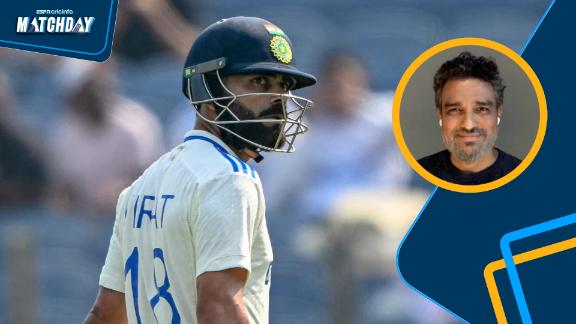New Zealand 259 and 198 for 5 (Latham 86, Blundell 30*, Washington 4-56) lead India 156 (Jadeja 38, Santner 7-53, Phillips 2-26) by 301 runs
New Zealand took massive strides towards doing the unthinkable: not just their first Test series win in India, but also India's first series defeat at home in 12 years. Mitchell Santner, who had never taken four wickets in an innings before this Test, and with just one first-class five-for to his name, tied India to the crease and took seven wickets to bowl India out for 156. The batters, led by Tom Latham, did some efficient front-running by attacking the Indian spinners to end the day with a lead of 301 runs with five wickets in hand.
India have only twice overturned a lead of 100 to win a Test: the great Kolkata Test in 2000-01, and a successful chase of over 400 in Port-of-Spain in 1976, for long the highest in Test cricket. They found themselves in this situation because their legendary spinners were outbowled by two who came into the match with two first-class five-fors between them. Glenn Phillips was Santner's partner in crime, taking out the two dangerous left-hand batters, Yashasvi Jaiswal and Rishabh Pant.
Santner bowled unchanged through the day for 17.3 overs. Six of his victims were either bowled or lbw as he kept attacking the stumps with balls behaving differently from the same spot. This wasn't quite the square turner that India lost their last Pune Test on - against Australia in 2016-17 - but there was enough turn and enough variation in turn to not allow India the ultra-aggressive approach they have employed this home season.
Right from the first three balls of the day, the challenge for India was apparent. From the same spot, the first one turned lesser than expected, the second one went straight on but Shubman Gill survived the umpire's call, and the third one turned big past the outside edge. There was not just turn, but also quick turn and natural variations from the surface.
India had batting till No. 9, but on such pitches, the depth doesn't mean much. So accurate was Santner that it took just 47 false shots to run through India. For the first half hour, though, New Zealand's patience and belief was tested. Gill managed to start breaking free with a six off Tim Southee after charging at him. Yashasvi Jaiswal drove Southee for a four, before Ajaz Patel, the lead spinner on paper, offered him another half volley.
But it turned around for New Zealand in the 22nd over of the day when Santner again beat Gill with one that went straight on. This time the umpire's call went the bowler's way. As the 15 seconds on the DRS timer lapsed, the crowd broke into a big cheer. For the arrival of Virat Kohli. The joy for them was short-lived as Kohli soon missed a full toss, which he tried to mow to square leg. The ball did drift in from the initial line, but it was still a full toss that Kohli would have dispatched almost every time had he played with a straighter bat.
By now, the effect of the roller was wearing off. Batters were shanking even full balls - or those that they got close to - by using their feet. The ones that didn't turn created further doubt. As it tends to happen at such times, fielders were everywhere: a hard sweep went straight into the shin of short leg, a short ball stopped and turned, and the pressure kept mounting.
With two left-hand batters in the middle, Latham went to Phillips post the first drinks break. It took Phillips four balls to turn one and take Jaiswal's edge to slip. Rishabh Pant, who had been kept quiet with in-out fields, then went to pull one that was only slightly short of a length. The ball stayed low and bowled him, drawing an inaudible invective that might end up hitting Pant in the wallet.
Sarfaraz Khan, who had shown proficiency against spin in Bengaluru, soon found out that the margin for error was little in Pune. If you had to attack, you needed everything to go right. He tried to go inside-out to a really full ball, and it still spooned just over cover. His sweep was blocked, and brought him just singles. Eventually, he tried to the clear the deepish mid-off without getting to the pitch of the ball, a reminder of Phillips' dismissal on day one. A shooter then did R Ashwin in, the first time Santner went past three wickets in a Test innings.
India had lost 6 wickets for 53 runs, and so far ahead were New Zealand that they could afford to make a DRS error and have Ajaz bowl to two left-hand batters four overs for 32 runs. Meanwhile, Santner kept attacking the stumps and kept producing enough chances. Only some hitting from Ravindra Jadeja and Washington Sundar took India past 150.
A lead of 103 here was a far worse scenario than the 356 in Bengaluru because this pitch was only going to get worse and India would have to bat last. Latham paddle-swept the first ball. A backward short leg came in to block that shot, and he cover-drove a boundary. Rohit Sharma was now just chasing the ball because you can't react when you trail by so much on a turning pitch.
The taking down of two of India's greatest match-winners was clinical. Sweeps, reverse sweeps, and the use of feet were all employed. Ashwin's first spell went for 33 in six overs, and Jadeja went for 24 in three. Washington, at the other end, kept picking up wickets. Devon Conway edged a sweep on to the pad, but didn't review the lbw decision. So far ahead were New Zealand.
Once they had got off to a start and the field had spread, Latham pitched his tent for a long innings while the others batted more briskly around him. Washington went on to convert his first-innings seven-for into only his second ten-wicket match haul in first-class cricket, but New Zealand found runs easier to come by at the other end. Latham missed out on a century, but he had brought New Zealand to a great position.




